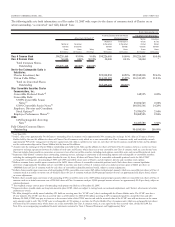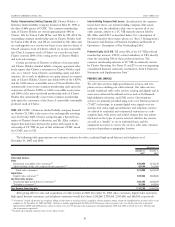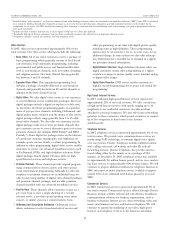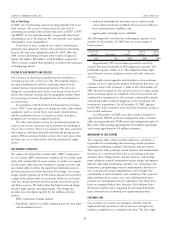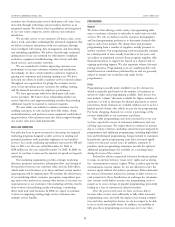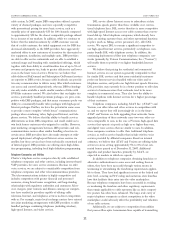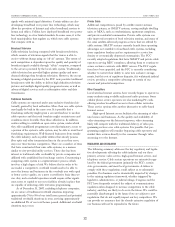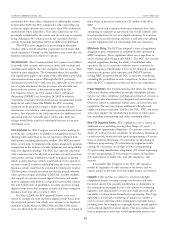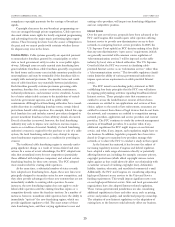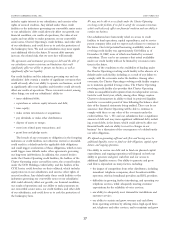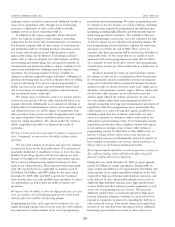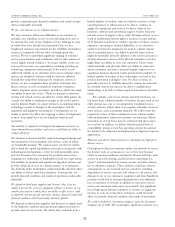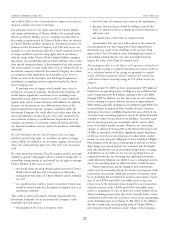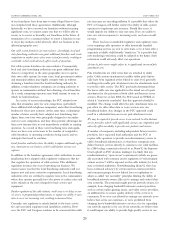Charter 2007 Annual Report Download - page 26
Download and view the complete annual report
Please find page 26 of the 2007 Charter annual report below. You can navigate through the pages in the report by either clicking on the pages listed below, or by using the keyword search tool below to find specific information within the annual report.
compulsory copyright payments for the carriage of broadcast
signals.
Copyright clearances for non-broadcast programming ser-
vices are arranged through private negotiations. Cable operators
also must obtain music rights for locally originated programming
and advertising from the major music performing rights organi-
zations. These licensing fees have been the source of litigation in
the past, and we cannot predict with certainty whether license
fee disputes may arise in the future.
Franchise Matters. Cable systems generally are operated pursuant
to nonexclusive franchises granted by a municipality or other
state or local government entity in order to cross public rights-
of-way. Although some recently enacted state franchising laws
grant indefinite franchises, cable franchises generally are granted
for fixed terms and in many cases include monetary penalties for
noncompliance and may be terminable if the franchisee fails to
comply with material provisions. The specific terms and condi-
tions of cable franchises vary materially between jurisdictions.
Each franchise generally contains provisions governing cable
operations, franchise fees, system construction, maintenance,
technical performance, and customer service standards. A num-
ber of states subject cable systems to the jurisdiction of central-
ized state government agencies, such as public utility
commissions. Although local franchising authorities have consid-
erable discretion in establishing franchise terms, certain federal
protections benefit cable operators. For example, federal law caps
local franchise fees and includes renewal procedures designed to
protect incumbent franchisees from arbitrary denials of renewal.
Even if a franchise is renewed, however, the local franchising
authority may seek to impose new and more onerous require-
ments as a condition of renewal. Similarly, if a local franchising
authority’s consent is required for the purchase or sale of a cable
system, the local franchising authority may attempt to impose
more burdensome requirements as a condition for providing its
consent.
The traditional cable franchising regime is currently under-
going significant change as a result of various federal and state
actions. In a series of recent rulemakings, the FCC adopted new
rules that streamlined entry for new competitors (particularly
those affiliated with telephone companies) and reduced certain
franchising burdens for these new entrants. The FCC adopted
more modest relief for existing cable operators.
At the same time, a substantial number of states recently
have adopted new franchising laws. Again, these new laws were
principally designed to streamline entry for new competitors, and
they often provide advantages for these new entrants that are not
immediately available to existing cable operators. In some
instances, the new franchising regime does not apply to estab-
lished cable operators until the existing franchise expires or a
competitor directly enters the franchise territory. In a number of
instances, however, incumbent cable operators have the ability to
immediately “opt into” the new franchising regime, which can
provide significant regulatory relief. The exact nature of these
state franchising laws, and their varying application to new and
existing video providers, will impact our franchising obligations
and our competitive position.
Internet Service
Over the past several years, proposals have been advanced at the
FCC and Congress that would require cable operators offering
Internet service to provide non-discriminatory access to their
networks to competing Internet service providers. In 2005, the
U.S. Supreme Court upheld an FCC decision making it less likely
that any non-discriminatory “open access” requirements (which
are generally associated with common carrier regulation of
“telecommunications services”) will be imposed on the cable
industry by local, state or federal authorities. The U.S. Supreme
Court held that the FCC was correct in classifying cable-
provided Internet service as an “information service,” rather than
a “telecommunications service.” This favorable regulatory classifi-
cation limits the ability of various governmental authorities to
impose open access requirements on cable-provided Internet
service.
The FCC issued a non-binding policy statement in 2005
establishing four basic principles that the FCC says will inform
its ongoing policymaking activities regarding broadband-related
Internet services. Those principles state that consumers are
entitled to access the lawful Internet content of their choice,
consumers are entitled to run applications and services of their
choice, subject to the needs of law enforcement, consumers are
entitled to connect their choice of legal devices that do not harm
the network, and consumers are entitled to competition among
network providers, application and service providers and content
providers. The FCC continues to study the network management
practices of broadband providers. It is unclear what, if any,
additional regulations the FCC might impose on our Internet
service, and what, if any, impact, such regulations might have on
our business. In addition, legislative proposals have been intro-
duced in Congress to mandate how providers manage their
networks or to direct the FCC to conduct a study in that regard.
As the Internet has matured, it has become the subject of
increasing regulatory interest. Congress and federal regulators
have adopted a wide range of measures directly or potentially
affecting Internet use, including, for example, consumer privacy,
copyright protections (which afford copyright owners certain
rights against us that could adversely affect our relationship with
a customer accused of violating copyright laws), defamation
liability, taxation, obscenity, and unsolicited commercial e-mail.
Additionally, the FCC and Congress are considering subjecting
high-speed Internet access services to the Universal Service
funding requirements. This would impose significant new costs
on our high-speed Internet service. State and local governmental
organizations have also adopted Internet-related regulations.
These various governmental jurisdictions are also considering
additional regulations in these and other areas, such as pricing,
service and product quality, and intellectual property ownership.
The adoption of new Internet regulations or the adaptation of
existing laws to the Internet could adversely affect our business.
CHARTER COMMUNICATIONS, INC. 2007 FORM 10-K
15


